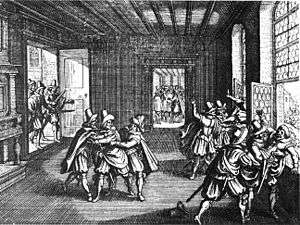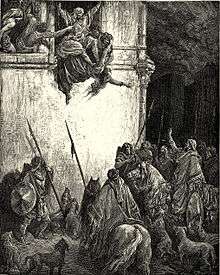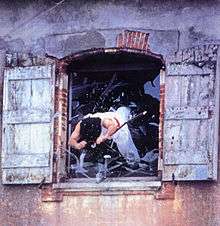Defenestration
Defenestration (from Old French fenestre, inherited from Latin fenestra) is the act of throwing someone or something out of a window.[1] The term was coined around the time of an incident in Prague Castle in the year 1618 which became the spark that started the Thirty Years' War. This was done in "good Bohemian style"; this referred to the defenestration which had occurred in Prague's City Hall almost 200 years earlier (July 1419), which also on that occasion led to war: the Hussite war.[2] The word comes from the New Latin[3] de- (down from) and fenestra (window or opening).[4] Likewise, it can also refer to the condition of being thrown out of a window, as in "The Defenestration of Ermintrude Inch".[5]

While the act of defenestration connotes the forcible or peremptory removal of an adversary, and the term is sometimes used in just that sense,[6] it also suggests breaking the windows in the process (de- also means removal).
Origin of the term
The term originates from two incidents in history, both occurring in Prague. In 1419, seven town officials were thrown from the Town Hall, precipitating the Hussite War. In 1618, two Imperial governors and their secretary were tossed from Prague Castle, sparking the Thirty Years War. These incidents, particularly that in 1618, were referred to as the Defenestrations of Prague and gave rise to the term and the concept.
Notable cases

Historically, the word defenestration referred to an act of political dissent. Notably, the Defenestrations of Prague in 1419 and 1618 helped to trigger prolonged conflict within Bohemia and beyond. Some Catholics ascribed the survival of those defenestrated at Prague Castle in 1618 to divine intervention.

- Around the 9th century BC, Queen Jezebel was defenestrated by her own eunuch servants, at the urging of Jehu, according to the Hebrew Bible. (2 Kings 9:33)
- In the Acts of the Apostles in the New Testament, the accidental autodefenestration of a young man of Troas named Eutychus is recorded. The Apostle Paul was travelling to Jerusalem and had stopped for seven days in Troas. While Paul was preaching in a third-story room late on a Sunday night to the local assembly of Christian believers, Eutychus drifted off to sleep and fell out of the window in which he was sitting. This incident is likely also the only recorded case of raising from death after fatal defenestration, as though Eutychus was taken up dead from the ground below, the Apostle Paul fell upon the body, embraced it, and then presented him alive to those present, whom the Bible indicates "were not a little comforted". (Acts 20:6–12)
- It has been suggested by several chronicles (notably the Annals of Westhide Abbey) that King John killed his nephew, Arthur of Brittany, by defenestration from the castle at Rouen, France, in 1203.
- In 1378, the crafts and their leader Wouter van der Leyden occupied the Leuven city hall and seized the Leuven government. Most of the patricians left the city and fled to Aarschot. After negotiations between the parties, they agreed to share the government. The patricians did not accept this easily, as it caused them to lose their absolute power. In an attempt to regain absolute control, they had Wouter van der Leyden assassinated in Brussels. Seeking revenge, the crafts handed over the patrician to a furious crowd. The crowd stormed the city hall and defenestrated the patricians. At least 15 patricians were killed during this defenestration of Leuven.
- In 1383, Bishop Dom Martinho was defenestrated by the citizens of Lisbon, having been suspected of conspiring with the enemy when Lisbon was besieged by the Castilians.
- In 1419 Hussite mob defenestrates a judge, the burgomaster, and some thirteen members of the town council of New Town of Prague.
- In 1452, King James II of Scotland murdered William Douglas, 8th Earl of Douglas, with his own hands and defenestrated him at Stirling Castle.
- On April 26, 1478, after the failure of the "Pazzi conspiracy" to murder the ruler of Florence, Lorenzo de' Medici, Jacopo de' Pazzi was defenestrated.
- In 1483, Prague's Old-Town portreeve and the bodies of seven murdered New-Town aldermen were defenestrated.
- On May 16, 1562, Adham Khan, Akbar's general and foster brother, was defenestrated twice for murdering a rival general, Ataga Khan, who had been recently promoted by Akbar. Akbar was woken up in the tumult after the murder. He struck Adham Khan down personally with his fist and immediately ordered his defenestration by royal order. The first time, his legs were broken as a result of the 12-metre (40-foot) fall from the ramparts of Agra Fort but he remained alive. Akbar, in a rare act of cruelty probably exacerbated by his anger at the loss of his favorite general, ordered his defenestration a second time, killing him. Adham Khan had wrongly counted on the influence of his mother and Akbar's wet nurse, Maham Anga, to save him as she was almost an unofficial regent in the days of Akbar's youth. Akbar personally informed Maham Anga of her son's death, to which she famously commented, 'You have done well.' She died 40 days later of acute depression.[7]
- In 1572, French King Charles IX's friend, the Huguenot leader Gaspard de Coligny, was killed in accordance with the wishes of Charles' mother, Catherine de' Medici. Charles had allegedly said "then kill them all that no man be left to reproach me". Thousands of Huguenots were killed in the St. Bartholomew's Day massacre after soldiers attacked Coligny in his house, stabbed him, and defenestrated him.
- In 1618, rebel Protestant leaders in Prague defenestrate two Catholic Royal regents and their secretary, who survived the 20-metre (68-foot) fall out of the windows of Prague Castle.
- On the morning of December 1, 1640, in Lisbon, a group of supporters of the Duke of Braganza party found Miguel de Vasconcelos, the hated Portuguese Secretary of State of the Habsburg Philip III, hidden in a closet, killed him and defenestrated him. His corpse was left to the public outrage.
- On June 11, 1903, a group of Serbian army officers murdered and defenestrated King Alexander and Queen Draga.
- In 1922, Italian politician and writer Gabriele d'Annunzio was temporarily crippled after falling from a window, possibly pushed by a follower of Benito Mussolini.[8]
- In March to April 1932, Ivanovo region of Soviet Union, due to ration cuts and labor intensification measures, strikes and spontaneous assemblies broke out. Ten thousand demonstrators ransacked the party and police buildings with slogans like "Toss the Communists . . . out the window."[9]
- On March 10, 1948, the Czechoslovakian minister of foreign affairs Jan Masaryk was found dead, in his pyjamas, in the courtyard of the Foreign Ministry below his bathroom window. The initial investigation stated that he committed suicide by jumping out of the window, although some believe that he was murdered by the ascendant Communists. A 2004 police investigation into his death concluded that, contrary to the initial ruling, he did not commit suicide, but was defenestrated, most likely by Czechoslovak Communists and their Soviet NKVD advisers for his opposition to the February 1948 Communist putsch.[10]
- On November 28, 1953, the U.S. biological warfare specialist Frank Olson died after a fall from a hotel window that may have been an assassination by the CIA.[11]
- On April 15, 1966, two suspects in the so-called Bathroom Coup in Sri Lanka, Corporal Tilekawardene and L. V. Podiappuhamy (otherwise known as Dodampe Mudalali), were said by the Criminal Investigations Department (CID) to have jumped to their deaths from the fourth floor of the CID building in the Fort. At the inquest, following receipt of new evidence, the magistrate altered the verdict of suicide to one of culpable homicide.[12] The remainder of the suspects were acquitted.
- In 1968, the son of China's future paramount leader Deng Xiaoping, Deng Pufang, was thrown from a window by Red Guards during the Cultural Revolution.
- In 1977, as a result of political backlash against his album Zombie, Fela Kuti's mother was thrown from a window during a military raid on his compound, the Kalakuta Republic by 1,000 Nigerian soldiers. The injuries sustained from the fall led to her death days later. In addition, the commanding officer defecated on her head, while the soldiers burned down the compound, destroying his musical equipment, studio and master tapes, and jailing him for being a subversive.[13]
- In 1991, British informer Martin McGartland was abducted by members of the Provisional IRA. As he waited to be interrogated, tortured and subsequently executed, McGartland escaped being assassinated by the IRA by jumping from a third floor window in a Twinbrook flat where he had been taken for interrogation following his abduction, and survived the fall.
- On July 9, 1993, the prominent Toronto attorney Garry Hoy fell from a window in a playful attempt to demonstrate to a group of new legal interns that the windows of the city's Toronto-Dominion Centre were effectively unbreakable. He had performed the same stunt on several previous occasions – dramatically slamming his body against the window – but this time it popped out of its frame and he fell to his death. The accident was later commemorated for its unusual nature by a 1996 Darwin Award and has been re-enacted in several films and television shows.[14][15][16]
- On October 26, 1997, NBA player Charles Barkley was arrested for hurling a bar patron through a plate-glass window after the man tossed a glass of ice at him.[17]
- The 2000 Ramallah lynching included throwing the (already-dead) body of either Vadim Nurzhitz or Yossi Avrahami out of a second-floor window, after those two Israeli soldiers had been lynched.
- On March 2, 2007, Russian investigative journalist Ivan Safronov, who was researching the Kremlin's covert arms deals, fell to his death from a fifth floor window. Friends and colleagues discount suicide as a reason and an investigation was opened looking into possible "incitement to suicide".[18]
- In 2007 in Gaza, gunmen allegedly affiliated with Hamas killed a Fatah supporter by defenestration, an act repeated the next day when a Hamas supporter was defenestrated by alleged supporters of Fatah.[19]
- 2017 Murder of Sarah Halimi, an antisemitic and Islamism-inspired terrorist murder of a French woman in her home near Paris.
Self-defenestration or autodefenestration

Self-defenestration or autodefenestration is the act of jumping, propelling oneself, or causing oneself to fall, out of a window. This phenomenon played a notable role in such events as the Triangle Shirtwaist fire of 1911, the 9/11 terror attacks on the World Trade Center, and other disasters. In December 1840, Abraham Lincoln and four other Illinois legislators jumped out of a window in a political maneuver designed to prevent a quorum on a vote that would have eliminated the Illinois State Bank. During the Revolutions of 1848, an agitated crowd forced their way into the town hall in Cologne and two city councillors panicked and jumped out of the window; one of them broke both his legs. The event went down in the city's history as the "Cologne Defenestration".[20]
Self-defenestration is also a method of suicide. In the United States, self-defenestration is among the least common methods of committing suicide (less than 2% of all reported suicides in the United States for 2005).[21]
In Hong Kong, jumping (from any location) is the most common method of committing suicide, accounting for 52% of all reported suicide cases in 2006, and similar rates for the years prior to that.[22] The Centre for Suicide Research and Prevention of the University of Hong Kong believes that it may be due to the abundance of easily accessible high-rise buildings in Hong Kong (implying that much of the jumping is out of windows or from roof tops).[23] Recent notables choosing this method of suicide include actor Leslie Cheung. On April 1, 2003, the Hong Kong superstar committed suicide by jumping from the 24th floor of Mandarin Oriental Hotel in the centre of Hong Kong, mentioning "depression" in a note.[24] Population density is such that it is not uncommon for the defenestratee to kill or maim a passerby upon arrival at the pavement below.
There is an urban legend in the U.S. that many Wall Street investors autodefenestrated during the 1929 stock market crash.[25] After the stock market collapse of 2008 this was alluded to by protestors brandishing a sign on Wall Street which said: "Jump, you fuckers!"[26]
Prominent examples of autodefenestration include James Forrestal, Gilles Deleuze, Edwin Howard Armstrong, Elizabeth Hartman and Steve Bing.
In popular culture
- In his poem Defenestration, R.P. Lister wrote with amusement over the creation of so exalted a word for so basic a concept. The poem narrates the thoughts of a philosopher undergoing defenestration. As he falls, the philosopher considers why there should be a particular word for the experience, when many equally simple concepts don't have specific names. In an evidently ironic commentary on the word, Lister has the philosopher summarize his thoughts with, "I concluded that the incidence of logodaedaly was purely adventitious."[27][28]
- There is a range of hacker witticisms referring to "defenestration". For example, the term is sometimes used humorously among GNU/Linux users to describe the act of removing Microsoft Windows from a computer.[29]
- Autodefenestration is a common method of escape in The Simpsons, often through closed windows for comedic effect.[30]
- In the 1987 Film RoboCop, the primary antagonist was defenestrated, having been propelled through the window by gunfire, at the end of the film.
References
- Oxford English Dictionary
- Swedish encyclopedia NE2000, digital version, article "defenestrestrationerna i Prag"
- same ref.; "New Latin" could be said to be the collection of "Latin" words which wasn't in use by the Romans
- Douglas Harper (2001). "defenestration". Online Etymological Dictionary. Archived from the original on 2016-10-10.
- Arthur C. Clarke; Tales from the White Hart, Ballantine Books, 1957
- "Latin American Herald Tribune - Caracas Metromayor's 'Political Defenestration' All But Complete in Venezuela". www.laht.com. Retrieved 9 May 2018.
- Abu Fazl, Akbarnama Archived 2008-11-21 at the Wayback Machine
- Duggan, Christopher (2013-03-06). "The allure of D'Annunzio". Times Literary Supplement. Archived from the original on 2014-11-11.
- Stephen Kotkin. Stalin: Volume 2. New York: Penguin Press. p. 95.
- Cameron, Rob (2001-01-06). "Police close case on 1948 death of Jan Masaryk – murder, not suicide". Radio Praha. Archived from the original on 2015-02-23.
- Schoenberg, Tom (2013-07-17). "CIA Cover-Up Suit Over Scientist's Fatal Fall Dismissed". Bloomberg News. Archived from the original on 2014-03-04.
- Salgado, M.S.L. (2007-07-20). "Dr. W.D.L. Fernando: Men of his calibre are rare". Tamil Week. Archived from the original on 2010-12-03.
- Matthew McKinnon (August 12, 2005). "Rebel Yells: A protest music mixtape". Canadian Broadcasting Corporation. Archived from the original on April 5, 2010. Retrieved 2009-11-22.
- Mikkelson, Barbara; Mikkelson, David P. (21 January 2007). "Through a Glass, Quickly". Snopes. Retrieved 5 September 2011.
- McNish, Jaquie (14 March 2007). "Law firm Goodman and Carr shutting down". The Globe and Mail. Archived from the original on 26 October 2012. Retrieved 2011-09-08.
- Mikkelson, Barbara; Mikkelson, David P. (1996). "1996 Darwin Awards: Lawyer Aloft". Darwin Awards. Archived from the original on 3 September 2011. Retrieved 5 September 2011.
- "The Augusta Chronicle: Local & World News, Sports & Entertainment in Augusta, GA". The Augusta Chronicle. Archived from the original on 28 April 2011. Retrieved 9 May 2018.
- Claims of 'incitement to suicide' after journalist falls to his death Archived 2007-05-15 at the Wayback Machine
- Palestinian gunmen target Haniyeh's home in Gaza, Associated Press, 11/06/2007 "Archived copy". Archived from the original on 2008-08-28. Retrieved 2008-10-04.CS1 maint: archived copy as title (link)
- Demmer, Manfred (2008-03-26). "Der 'Kölner Fenstersturz' 1848". Neue Rheinische Zeitung (in German). Archived from the original on 2015-04-02.
- "WISQARS Leading Causes of Death Reports". Archived from the original on 2009-08-25. Retrieved 2009-07-06.
- "Method Used in Completed Suicide". HKJC Centre for Suicide Research and Prevention, University of Hong Kong. 2006. Archived from the original on 2009-09-10. Retrieved 2009-09-10.
- 周志鴻; 譚健文 (9 August 2009). "遭家人責罵:掛住上網媾女唔讀書 成績跌出三甲 中四生跳樓亡". Apple Daily. Archived from the original on 15 March 2010. Retrieved 2009-09-10.
- "Leslie Cheung had last drink before leaping to his death". scmp.com. Archived from the original on 9 March 2018. Retrieved 9 May 2018.
- "After the 1929 stock market crash, did investors really jump out of windows?". straightdope.com. 30 August 2002. Archived from the original on 21 March 2018. Retrieved 9 May 2018.
- Linda McQuaig, Neil Brooks (2012). Billionaires' Ball: Gluttony and Hubris in an Age of Epic Inequality. Beacon Press. ISBN 978-0807003404.
- R. P. Lister; Defenestration; The New Yorker, 16 September 1956.
- J. M. Cohen (Ed.); Yet more comic and curious verse; Penguin Books (1959)
- Eric S. Raymond The New Hacker's Dictionary Publisher: MIT Press 1996 ISBN 978-0-262-68092-9
- Diving out of the window, Simpson Crazy. "Archived copy". Archived from the original on 2018-04-17. Retrieved 2018-04-16.CS1 maint: archived copy as title (link)
| Look up defenestration in Wiktionary, the free dictionary. |